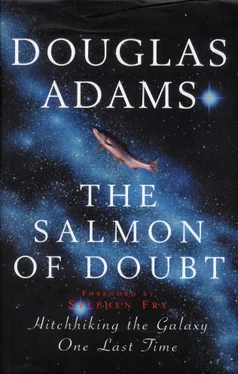Of course, everything you do with language just balloons as a problem. To begin with, we wanted to do it whereby it would be text-to-speech, which gives you the advantage that you have much more flexibility in constructing sentences on the fly. On the other hand, all of your characters sound like semi-concussed Norwegians, which I felt was a downside. So we eventually realized we were going to have to do prerecorded speech. And I thought, “That’s terrible, because you only have a limited number of responses. It’s just going to be ... Oh, I’m not sure about that.” So the way we eventually solved the problem, or gradually solved the problem, was that the amount of prerecorded speech just got bigger, and bigger, and bigger, and bigger. We just did another two-hour recording session this morning. We’ve now got something like sixteen hours of little conversational snippets: little phrases, sentence half-sentences, and all the things the machine puts together on the fly in response to what you type in. For a long time it wasn’t working very well. And now, just really in the last two or three weeks, it’s started to come together, and it’s started to be spooky. People come in and say, “Yeah, yeah, yeah, I don’t see how this is going to work. How ’’bout if you ask it this?” and they do, and their jaw drops. It’s just wonderful. People come in and spend hours just sitting, locked in conversation with these characters. I hasten to add that with the sixteen hours of dialogue, it was a small team of us who wrote it. I did part of the dialogue writing, and other people did some, and we all pulled it together. It’s pretty remarkable when it works, you suddenly have this populated world. Very strange, damaged robots crawling around the place, all of whom have a wide range of opinions and attitudes and ideas and strange histories, and know about some entirely unexpected things. You can engage them all in conversation.
hasten to add that with the sixteen hours of dialogue, it was a small team of us who wrote it. I did part of the dialogue writing, and other people did some, and we all pulled it together. It’s pretty remarkable when it works, you suddenly have this populated world. Very strange, damaged robots crawling around the place, all of whom have a wide range of opinions and attitudes and ideas and strange histories, and know about some entirely unexpected things. You can engage them all in conversation.
Do you feel concerned that after all this work, people won’t treat it with the gravity of, say, a movie or a book? That they won’t treat it as an art form? D.A. I hope that’s the case, yes. I get very worried about this idea of art. Having been an English literary graduate, I’ve trying to avoid the idea of doing art ever since. I think the idea of art kills creativity. That was one of the reasons I really wanted to go and do a CD-ROM: because nobody will take it seriously, and therefore you can sneak under the fence with lots of good stuff. It’s funny how often it happens. I guess when the novel started, most early novels were just sort of pornography. Apparently, most media actually started as pornography and sort of grew from there. This is not a pornographic CD-ROM, I hasten to add. Before 1962, everybody thought pop music was sort of ... Nobody would have ever remotely called it art, and then somebody comes along and is just so incredibly creative in it, just because they love it to bits and think it’s the greatest fun you can possibly have. And within a few years, you’ve got Sgt. Pepper’s and so on, and everybody’s calling it art. I think media are at their most interesting before anybody’s thought of calling them art, when people still think they’re just a load of junk.
O. But, say, twenty years from now, would you like to be recognized as one of the earliest practitioners of CD-ROM as art?
D.A. Well, I would just like a lot of people to have bought it. One, for the extremely obvious reason.
But the other is that if it’s popular and people really like it and have fun with it, you feel you’ve done a good job. And if somebody wants to come along and say, “Oh, it’s art,” that’s as it may be. I don’t really mind that much. But I think that’s for other people to decide after the fact. It isn’t what you should be aiming to do. There’s nothing worse than sitting down to write a novel and saying, “Well, okay, I’m going to do something of high artistic worth.” It’s funny. I read something the other day, just out of absolute curiosity; I read Thunderball, which is one of the James Bond books that I would love to have read when I was, I don’t know, about fourteen, just sort of thumbing through it for the bits where he puts his left hand on her breast and saying, “Oh my God, how exciting.” But I just thought, Well, James Bond has become such an icon in our pop culture of the last forty years, it would be interesting to see what it actually was like. And what prompted me to do this, apart from the fact that I happened to find a copy lying around, was reading someone talking about Ian Fleming and saying that he had aimed not to literary, but to be literate. Which is a very, very big and crucial difference. So I thought, well, I’ll see if he managed to do that. It’s interesting, because it was actually very well written as a piece of craft. He knew how to use the language, he knew how to make it work, and he wrote well. But obviously nobobody would call it literature. But I think you get most of the most interesting work done in fields where people don’t think they’re doing art, but are merely practicing a craft, and working as good craftsmen. Being literate as a writer is good craft, is knowing your job, is knowing how to use your tools properly and not to damage the tools as you use them. I find when I read literary novels—you know, with a capital “L”—I think an awful lot is nonsense. If I want to know something interesting about a way human beings work, how they relate to each other and how they behave, I’ll find an awful lot of women crime novelists who do it better, Ruth Rendell for instance. If I want to read something that’s really giving me something serious and fundamental to think about, about the human condition, if I like, or what we’re all doing here, or what’s going on, then I’d rather read something by a scientist in the life sciences, like Richard Dawkins. I feel that the agenda of life’s important issues has moved from novelists to science writers, because they know more. I tend to get very suspicious of anything that thinks it’s art while it’s being created. As far as being a CD-ROM is concerned, I just wanted to do the best thing I could and have as much fun as I could doing it. I think it’s pretty good. There are always bits that you fret over for being less than perfect, but you can keep on worrying over something forever. The thing is pretty damn good.
less than perfect, but you can keep on worrying over something forever. The thing is pretty damn good.
You’ve got the movie, too. I’d heard rumors of a Hitchhiker’s Guide movie kicking around for decades.
D.A. Oh, well, yeah. Although it sort of bubbles under, there have been two previous sources of rumors.
One was when I originally sold the rights about fifteen years ago to Ivan Reitman, who was not as well-known then as he is now. It really didn’t work out, because once we got down to it, Ivan and I didn’t really see eye-to-eye. In fact, it turned out he hadn’t actually read the book before he bought it.
He’d merely read the sales figures. I think it really wasn’t his cup of tea, so he wanted to make something rather different. Eventually, we agreed to differ and went our respective ways, and by this time the ownership had passed from him to Columbia, and he went on to make a movie called Ghostbusters, so you can imagine how irritated I was by that. It sat there owned by Columbia for many years. I think Ivan Reitman then got somebody else to write a script based on it, which is, I think, the worst script I’d ever read. Unfortunately, it has my name on it and the other writer’s, whereas I did not contribute a single comma to it. I’ve only just discovered that that script has been sitting in script city, or whatever it is, for a long time, and that everyone assumes I wrote it and am therefore a terrible screenwriter. Which is rather distressing to me. So then, a few years ago, I was introduced to someone who became a great friend of mine, Michael Nesmith, who has done a number of different things in his career: In addition to being a film producer, he was originally one of the Monkees. Which is kind of odd when you get to know him, because he’s such a serious, thoughtful, quiet chap, but with quiet reserves of impish glee. So his proposal was that we go into partnership together to make this. He’s the producer, and I do the scripts and so on. We had a very good time working on it for quite a while, but I just think Hollywood at that point saw the thing as old. It’s been around the block. And basically, what I was being told an awful lot was essentially, “Science-fiction comedy will not work as a movie, and here’s why not: If it could work, somebody would have done it already.”
Читать дальше










